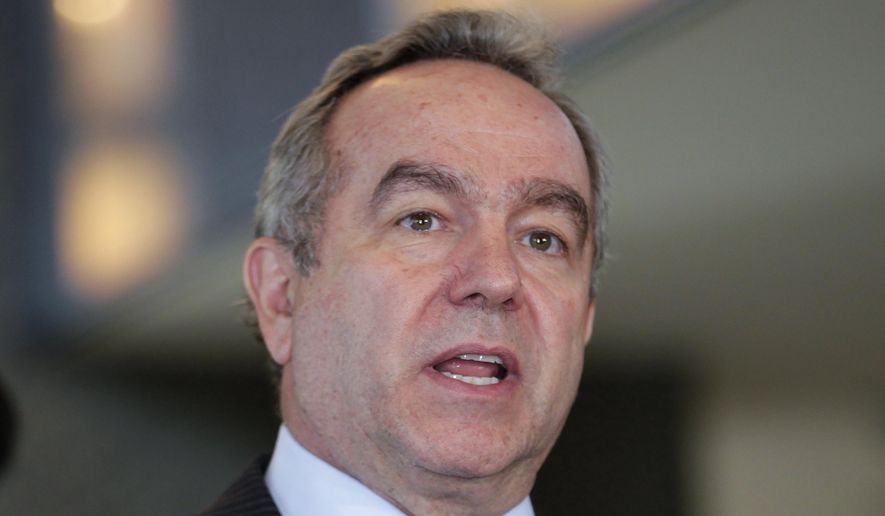A version of this story appeared in the daily Threat Status newsletter from The Washington Times. Click here to receive Threat Status delivered directly to your inbox each weekday.
President Biden’s nominee as the State Department’s No. 2 declared on Thursday the Obama-era nuclear deal is dead, suggesting the administration has quit trying to revive the accord.
National Security Council Coordinator for Indo-Pacific Affairs Kurt Campbell, whom Mr. Biden has nominated to be deputy secretary of state, said restarting the 2015 nuclear deal — known in diplospeak as the Joint Comprehensive Plan of Action — is “just not on the table” anymore.
“I don’t think anyone sees that there’s any chance in the current environment to go back to the JCPOA,” he said at his confirmation hearing before the Senate Foreign Relations Committee, adding, “It’s not up for discussion.”
Republicans say the administration pandered dangerously to Iran during the 2021-22 time frame in pursuing a renewal of the 2015 nuclear deal that former President Donald Trump withdrew from in 2018 on grounds it failed to address Tehran’s backing of such terrorist groups as Hamas.
The Biden administration came to office in 2021 pushing negotiations toward restoring the deal that gave Iran billions in economic sanctions relief in exchange for limits to its nuclear enrichment activities. The talks broke down in October 2022 amid a spike in uranium enrichment by Iran — the process needed to make nuclear bombs — and antagonistic posturing by Iranian negotiators.
Mr. Biden’s Iran policy drew fresh fire from critics during subsequent months when news broke that backchannel diplomacy resulted in a deal to free up $6 billion in frozen Iranian assets as part of a prisoner swap between five Americans detained by Tehran and an unknown number of Iranians imprisoned in the U.S.
Under the prisoner deal, the $6 billion was transferred from holding accounts in South Korea to Qatar. Republican lawmakers were outraged by the development and vowed to block Iran from accessing the money, asserting it would be used by Tehran to fund terrorism.
Following the Oct. 7 Hamas attack on Israel, the Biden administration said it reached an understanding with Qatar that Iran couldn’t access the $6 billion. More recently, the GOP-controlled House passed a resolution aiming to block Tehran from landing the money.
In the interim, reports emerged that the administration moved in November to free up a separate $10 billion for Iran as part of an agreement to let neighboring Iraq buy electricity from the Islamic republic without fear of U.S. penalties for violating sanctions on Iran.
Administration officials have said the $10 billion is part of a 120-day sanctions waiver extension, arguing the money is held in escrow for Iraqi energy purchases, and that Iran would have limited access to it to buy humanitarian goods for its citizens.
Several lawmakers on Capitol Hill have again expressed outrage, arguing the move amounts to a reward for Iran at a moment when Tehran celebrated the Hamas attack on Israel, as well as attempted strikes on U.S. forces in the Middle East by other proxies, including Houthi militants in Yemen.
The Senate Foreign Relations Committee ranking Republican, James Risch of Idaho, raised the issue during Mr. Campbell’s confirmation hearing Thursday.
“What in the world is the administration thinking about freeing up cash to Iran? I mean, I was aghast when the administration started with the first $6 billion, and then, even worse than that, after the fighting started in Israel, they’re talking about the other $10 billion?” Mr. Risch asked.
“Help me understand this. I just can’t square that circle, I really can’t,” the senator said to Mr. Campbell, whose influence over the administration’s Iran policy will be expanded if he’s confirmed as deputy secretary of state.
Mr. Campbell defended the policy, asserting that “the administration has not lifted any sanctions on Iran.”
“I recognize the concerns on the $6 billion, and you’ve heard all the arguments more generally that the money has not been spent. It’s all in an account,” Mr. Campbell said.
“We have absolutely full confidence that if money were taken out, that it would be used specifically for the Iranian people and for humanitarian concerns,” he said.
“But I do want to just underscore,” Mr. Campbell added, “we’re in an environment right now where Iran is taking a role that is so antithetical to our interests that we must be even more vigilant.”
He also noted, “We must be sending a military message that provocations will be met, and met with stern responses. We must isolate them diplomatically, internationally.”
• Guy Taylor can be reached at gtaylor@washingtontimes.com.




Please read our comment policy before commenting.